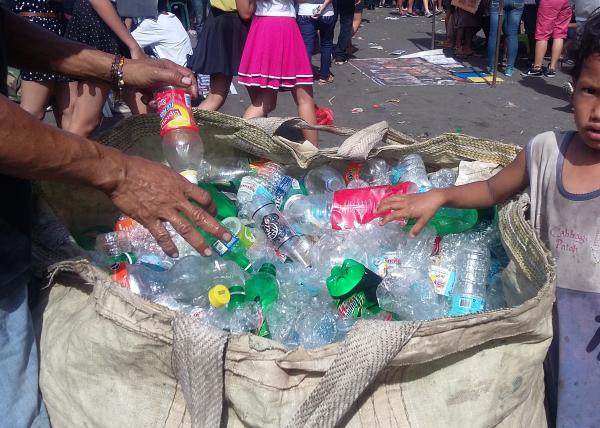Higher fuel production eyed at plastic recycling facility

Using Japanese technology brought to Cebu by Mansei Recycle Systems Co. Ltd., plastic bottles are processed and transformed into fuel at the Inayawan recycling facility financed by Japan International Cooperation Agency. (CDN FILE PHOTO)
The Japanese recycling company running the pilot waste-to-energy plant inside Cebu City’s Inayawan landfill wants to scale up operations and increase fuel production.
But Takeshi Konishi, representative of Mansei Recycle Systems Co., Ltd., said the Cebu City government will have to first strictly implement waste segregation at source to facilitate the delivery of plastic waste materials to the recycling plant.
He also suggested that the city set up a simple Materials Recovery Facility (MRF).
Mansei provided the technology to convert plastic fluff into fuel at the recycling plant, a P15-million facility funded by Japan International Cooperation Agency (JICA).
During a workshop with city and barangay officials at City Hall’s Social Hall on Tuesday afternoon, Konishi said the recycling plant in Inayawan currently produces an average of five tons of fuel a day for cement manufacturer Cemex Philippines.
“But Cemex is capable of receiving 150 tons of fuel a day,” said lawyer Jade Ponce, who heads the city’s Solid Waste Management Board (SWMB).
Eduardo Bernard Pons, Cemex energy director, said they were willing to continue buying fuel from the recycling plant.
“The length of the contract is not our main concern. The most important thing is to make this initiative to keep on going. It has been a very successful proof of concept, proving that this project is a good way to reduce the amount of waste going to the landfill,” he said.
Ponce did not specify the volume of plastic wastes required to produce a ton of fuel, which Cemex uses as alternative to coal.
He said the board will still meet and discuss the plan to expand the recycling plant.
The facility started operations in February this year. It is among the P30 million worth of projects that JICA is funding in Cebu City.
Ponce said expanding the facility will help reduce around 30 percent of the volume of garbage produced by the city every day.
Based on the records of the city’s Department of Public Services (DPS), the city dumps an average of 500 tons of mixed garbage every single day. Between 16 percent and 30 percent are plastic.
City Councilor Nida Cabrera, chair of the committee on environment, said the facility also helps reduce carbon emissions.
She also said the city government, which will assume ownership of the facility next year, earns from the sale of fuel.
Only the recycling plant is still operating within the sanitary landfill, which was shut down in January this year after reaching its maximum capacity.
The city government plans to transform the landfill into a prime mixed-use area with residential and commercial components.
JICA supervises the overall implementation of the waste-to-energy project and assumes the cost of the equipment, among others, while Mansei provides technical capacity development by sending managerial and engineering staff from Japan for the operation and maintenance of the facility and providing marketing support for the sale of the fuel, Cabrera said.
Disclaimer: The comments uploaded on this site do not necessarily represent or reflect the views of management and owner of Cebudailynews. We reserve the right to exclude comments that we deem to be inconsistent with our editorial standards.
